
In the digital age, education has transcended traditional classroom boundaries, embracing the vast potential of online platforms. Among the pioneers leading this transformation is Coursera, a platform that has democratized access to quality education worldwide. Founded in 2012, Coursera has become synonymous with accessible, flexible, and high-quality learning, collaborating with top universities and organizations to offer a plethora of courses and programs to learners everywhere.
Founding Vision and Mission
Coursera was established by Stanford University computer science professors Daphne Koller and Andrew Ng. Their vision was rooted in the belief that education is a fundamental right and should be accessible to anyone, anywhere. Recognizing the limitations of traditional education systems, they aimed to leverage technology to bridge educational gaps and provide universal access to world-class learning experiences.
The mission of Coursera is to provide universal access to the world’s best education, partnering with top universities and organizations to offer courses, certificates, and degree programs that empower individuals to achieve their personal and professional goals.
Growth and Expansion
Since its inception, Coursera has experienced exponential growth. Initially offering a handful of courses, the platform now boasts over 7,000 courses, specializations, and degree programs across various disciplines, including technology, business, health, and the arts. Collaborations with more than 275 leading universities and companies, such as Stanford, Yale, Google, and IBM, have enriched Coursera’s offerings, ensuring that learners receive up-to-date and industry-relevant education.
Coursera’s user base has expanded to over 77 million learners worldwide, reflecting the platform’s global reach and the increasing demand for flexible, online learning solutions. From first-time college students to mid-career professionals and retirees eager to explore new interests, Coursera has become a trusted resource for lifelong learning.
Innovative Learning Models

Coursera has introduced several innovative learning models to cater to diverse learner needs:
-
Specializations: These are series of related courses designed to help learners deepen their expertise in a particular subject area. Specializations often culminate in a hands-on project, allowing learners to apply their knowledge practically.
-
Professional Certificates: Developed in collaboration with industry leaders like Google and IBM, these programs are tailored to equip learners with job-ready skills in high-demand fields such as data science, IT support, and digital marketing.
-
Degree Programs: Coursera offers fully accredited bachelor’s and master’s degree programs from renowned institutions, providing a more accessible and affordable alternative to traditional on-campus degrees.
-
Guided Projects: These short, hands-on learning experiences help users build job-relevant skills using real-world tools in under two hours, making them ideal for busy professionals.
-
MasterTrack Certificates: Portions of master’s programs split into modules that offer a certificate upon completion, allowing students to earn academic credentials without committing to a full degree.
Coursera for Business and Government
Understanding the evolving needs of the workforce, Coursera launched “Coursera for Business” and “Coursera for Government” initiatives. These programs are designed to upskill employees and public servants, ensuring that organizations and governments can adapt to the rapidly changing economic landscape.
By providing tailored learning paths and analytics, Coursera enables organizations to identify skill gaps and implement effective training programs, fostering a culture of continuous learning and development. Some major clients include L’Oréal, Novartis, and the government of India, all leveraging Coursera to empower their workforce.
Commitment to Accessibility and Inclusion

Coursera’s commitment to making education accessible extends beyond course offerings. The platform provides financial aid and scholarships to learners who may not afford the course fees, ensuring that economic barriers do not hinder educational pursuits.
Moreover, Coursera’s user-friendly interface, availability of courses in multiple languages, and mobile accessibility make learning convenient for individuals across different regions and backgrounds. The platform also supports subtitles, transcripts, and flexible deadlines, accommodating different learning styles and needs.
During the COVID-19 pandemic, Coursera took significant steps to support education continuity by launching the “Coursera for Campus” initiative, allowing universities to offer their students free access to Coursera’s course catalog. This effort helped millions of students continue their studies despite widespread disruptions.
Impact and Recognition
Coursera’s impact on global education has been profound. By breaking down geographical and financial barriers, the platform has empowered millions to pursue their educational and career aspirations. During times of crisis, such as the COVID-19 pandemic, Coursera played a pivotal role in providing uninterrupted learning opportunities, partnering with governments and institutions to offer free access to courses.
The platform’s efforts have been recognized through various accolades, including being named to Time Magazine’s 100 Most Influential Companies list and achieving certification as a B Corporation. These honors reflect Coursera’s commitment to social and environmental performance, accountability, and transparency.
Coursera has also contributed to closing the skills gap. According to a 2023 Coursera Global Skills Report, countries that actively embrace online learning see measurable improvements in workforce productivity and digital literacy.
Learner Success Stories
Coursera’s true impact can be seen through the stories of its learners. From a single mother in Brazil who landed a tech job after completing Google IT courses, to a refugee in Kenya who used Coursera to gain business knowledge and start his own company, these stories highlight the platform’s role in changing lives.
Testimonials often emphasize the flexibility, quality, and affordability of Coursera’s programs. For many, it has opened doors to careers, promotions, or even entirely new life paths.
Challenges and Future Outlook
While Coursera has achieved significant milestones, it faces challenges common to online education platforms, such as ensuring course completion rates and maintaining engagement. To address these, Coursera continues to innovate by incorporating interactive elements, peer assessments, and community forums to enhance the learning experience.
Looking ahead, Coursera aims to expand its reach further, exploring new technologies like artificial intelligence to personalize learning and improve outcomes. The platform is also focusing on building more partnerships with educational institutions and employers to align courses with real-world skills and job market demands.
Additionally, Coursera is exploring the integration of blockchain for secure and verifiable credentialing, aiming to build greater trust and portability in its certifications.
Conclusion
Coursera stands as a testament to the transformative power of technology in education. By providing accessible, high-quality learning opportunities, it has redefined how individuals approach personal and professional development. As the platform continues to evolve, its commitment to democratizing education remains steadfast, promising a future where learning is truly without limits.
Whether you’re looking to upskill for a new job, earn a degree, or simply explore a new interest, Coursera offers a path forward. In a world that values knowledge more than ever, platforms like Coursera are not just changing education; they are shaping the future.

